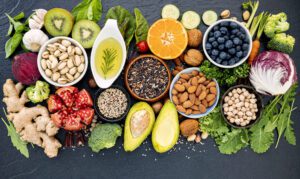5 Best Foods for Enhancing Athlete’s Performance

Nutrition plays an integral role in athletic performance. Although proteins, carbs, and fats are all necessary in fueling athletic performances, superfoods stand out when it comes to energy, recovery, and overall athletic ability.
They contain vitamins, minerals, and antioxidants, all of which support your body during intense training or competition.
In addition to eating healthily, athletes may turn to supplements like MK677 capsules to assist muscle recovery and growth. Still, nothing beats eating whole-food diets when it comes to superfood consumption.
This article will examine which superfoods to include in your diet to maximize peak performance for lifting, running, or cycling.
1. Leafy Greens as Supercharged Nutrients
Rich in iron, calcium, and magnesium, leafy greens like spinach, kale, and Swiss chard are among the most nutrient-dense foods you can consume. They also offer antioxidant protection that lowers inflammation and promotes healing.
It is imperative for athletes to make sure their bodies are getting adequate minerals, and leafy greens offer a fantastic way to gain those vital elements without just using pills. Leafy greens can improve muscle function, boost endurance, and reduce the risk of cramps and weariness by being a regular part of meals.
2. Berries as Powerhouses of Antioxidants in Nature
Strong antioxidants are found in berries like blueberries, strawberries, and raspberries. They shield cells against oxidative stress brought on by vigorous exercise. Additionally, by reducing post-workout inflammation and pain, these berries promote muscle repair.
In addition to their anti-inflammatory properties, berry fruits are rich in vitamins, fiber, and water, which help with digestion and keep us hydrated. Additionally, they naturally sweeten food without adding as much sugar as packaged snacks do. They are a great addition to smoothies or as a snack.
3. Salmon is the Ultimate Protein and Omega-3 Source
When it comes to supporting muscle repair and inflammation reduction, salmon should be at the top of your list. Packed with proteins and omega-3 fatty acids, salmon helps ease post-workout muscle soreness while improving joint health, lowering injury risks, and aiding overall recovery.
Salmon’s protein can aid athletes who engage in strength training or other intense forms of physical exercise by building and repairing muscle tissue, an essential aspect of successful performance. Consuming regular salmon consumption has also been shown to promote cardiovascular health and brain function improvement, and support lean muscle mass development.
4. Quinoa is a Complete Plant-Based Protein
, also known as a “super grain,” is one of the only plant-based sources of complete plant protein. This means it provides all nine essential amino acids our bodies cannot produce on their own, making it ideal for plant-based diets or those looking to decrease meat consumption.
Quinoa is rich in protein, fiber, magnesium, and iron, nutrients that contribute to energy production and support a strong immune system.
5. Nuts and Seeds for Energy and Recovery
Nuts and seeds offer vital, sustained energy. Because they include essential fatty acids that enhance brain function, balance hormone levels, and help preserve energy throughout the day, almonds, walnuts, chia seeds, and flaxseeds are especially beneficial for athletes.
Along with healthy fats, these foods are excellent providers of fiber, protein, and important minerals like zinc and magnesium. They also make excellent post-workout snacks or a nutritious addition to salads and smoothies.
Conclusion
Superfoods may be used by athletes to maximise their performance. They are packed with nutrients that help athletes perform better, recover faster, and stay healthy over time. One surefire way to provide your body with the nutrients it needs to meet your athletic goals is to incorporate them into your daily meals.
Keep in mind that your nutrition should be the foundation of your training program, with supplements added as needed to meet specific needs. Just concentrate on diversity, balance, and consistency.




